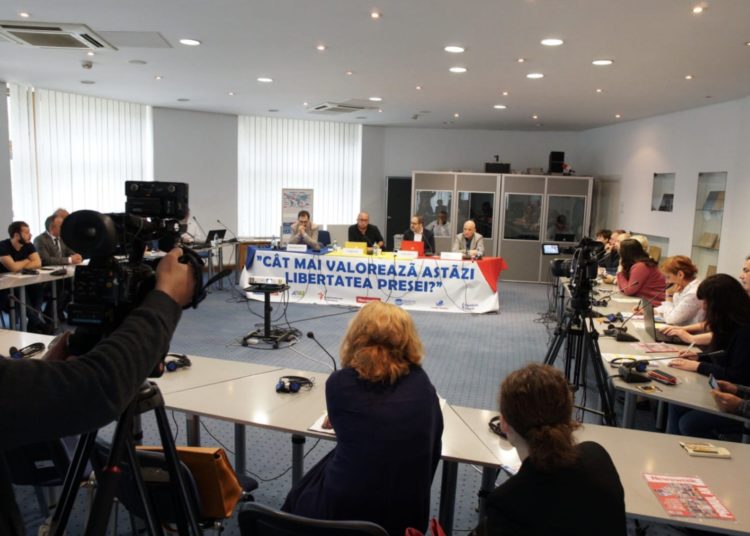Turkey, a long-time member of NATO, has been undermining the transatlantic alliance from within under the rule of authoritarian Islamist President Recep Tayyip Erdoğan for years now, said Abdullah Bozkurt, director of the Swedish-based Nordic Research and Monitoring Network.
At an event organized in the Romanian capital of Bucharest to discuss press freedom woes in Turkey, where nearly 200 journalists are jailed on false charges, Bozkurt explained how the regime of President Erdoğan is is going after critical journalists to do away with the counter-narrative that challenges his vision for Turkey and that sounds alarm bells over distancing Turkey from its traditional allies and partners.
“Erdogan and his Islamist and neo-nationalist allies have been building a new Turkey in their own image and are bent on diverting Turkey from NATO and democratic European institutions such as the European Union and the Council of Europe. For that they need to silence critical voices in Turkish society, beginning with critical and independent journalists,” he remarked.

The purge and/or imprisonment of half the generals and thousands of officers including most who were posted at NATO missions abroad has served to achieve the aim of disengaging Turkey from the alliance, he added. Bozkurt also said the evidence showed that most of the purged officers were not even involved in a failed coup in 2016, when only 1 percent of the military was mobilized in what appears to have been a false flag operation to fast track the transformation of the regime.
Nobody in their right mind can be convinced that 30 percent of all diplomats in the Turkish Foreign Ministry and one in every three judges and prosecutors became terrorists overnight simply because Erdoğan said so, Bozkurt pointed out, recalling that no administrative or judicial investigations were conducted into the allegations and no evidence was presented to support terrorism or coup plotting charges. “This was all part of a well-orchestrated move to transform democratic institutions into partisan tools that can be abused by the regime to promote a dangerous political Islamist vision to Turkey and abroad,” he remarked.
Turkey’s insistence on purchasing Russian S-400 long range missiles, its support for armed jihadist groups including al-Qaeda and the Islamic State in Iraq and the Levant (ISIL), its opposition to sanctions on Iran and public threats to shut down NATO operations in Turkey including a radar base in Kürecik that works in tandem with the Romanian Deveselu Air Base, where an Aegis Ashore system was installed to provide support for NATO’s overall ballistic missile defense (BMD) system are troubling indications about where Turkey wants to go under Erdoğan, Bozkurt noted.

The event was held at the headquarters of the Institutul Naţional de Statistică, the government statistical agency located across from the Palace of Parliament. The day-long panel discussion was moderated by veteran Romanian journalist Teodor Tita, news editor at radio station Europa FM. Participants included Sabin Orcan, the editor-in-chief of Newsweek Romania, which published a four-page ad listing the names of all 191 journalists who are jailed in Turkey in a special edition that commemorated the first anniversary of its publication. Levent Kenez, the executive director of the Stockholm Center for Freedom (SCF), which maintains a database of jailed journalists and monitors their legal cases in Turkey, delivered a presentation of the situation of media outlets and journalists in Turkey.
“The jailing of journalists in Turkey followed a familiar pattern, and the selection was by no means a random process,” Kenez argued, providing specific examples from the cases of imprisoned journalists who wrote about corruption in government and exposed Erdogan’s clandestine support for armed jihadist groups in Syria. “The country’s best investigative journalists were targeted in the initial sweep by the government, and then it became a huge crackdown that ensnared everybody in the critical, independent and opposition media,” Kenez argued.

In the afternoon panel debate, Cristina Guseth, director of the Freedom House Romania Foundation, spoke about solidarity among journalists in opposing the crackdown on press freedoms and suggested that a Europe-wide network as well as a global one can be established to strengthen the voices of those who advocate freedom of the press and freedom of speech. Ana Maria Luca, a Romanian correspondent who works for the Balkan Investigative Reporting Network (BIRN) and writes for Balkan Insight, highlighted the polarization in the media landscape and promoted the view that journalists must be united in defending their rights and freedoms. Adelina Rădulescu, an editor with Radio Free Europe/Radio Liberty (RFE/RL) Romanian Service, was also among the participants in the discussion.
The event was co-sponsored by Newsweek Romania, the Freedom House Foundation, RFE/RL Romania Service, SCF, Nordic Research and Monitoring Network, Zaman Romania and Asociația pentru Dialog și Valori Universale.












